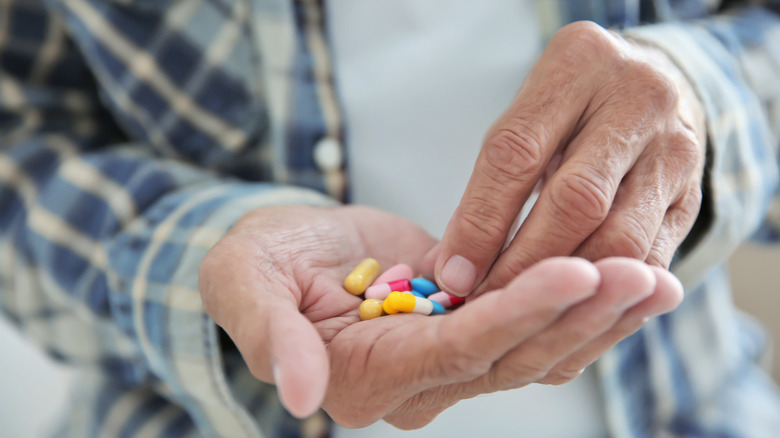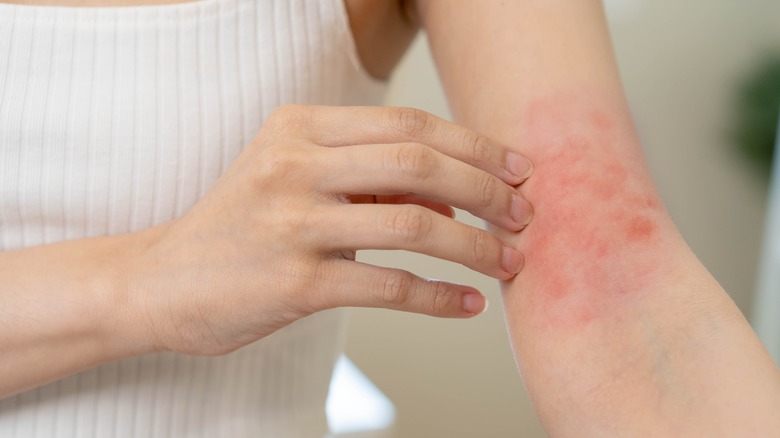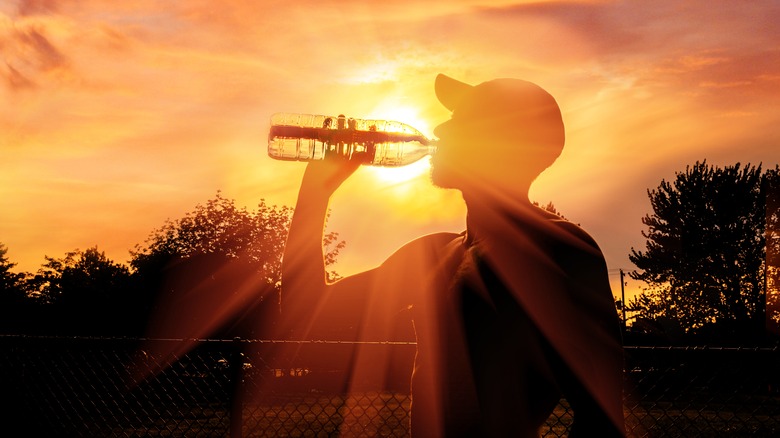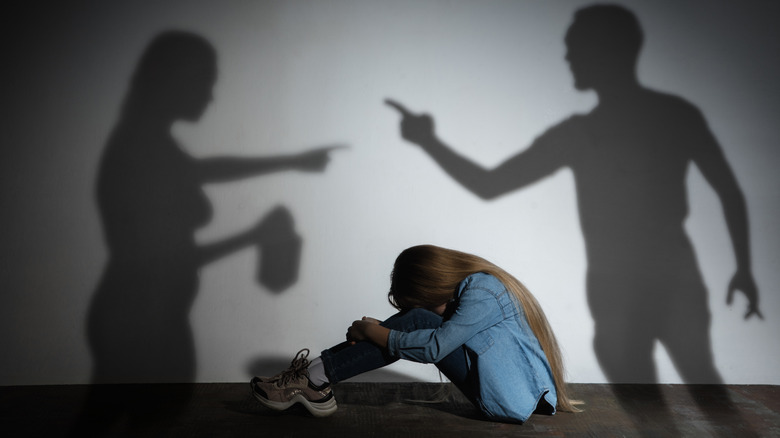Here's What Really Happens To You During A Heat Wave, According To Science
The definition of a heat wave varies: According to the National Oceanic and Atmospheric Administration, it's only a heat wave if high temperatures — outside of the norm for any particular area — persist for two or more days. The Met Office says it's a little different for the U.K., and a heatwave has to last for three or more days. Still, the principle is the same: It's hotter than normal, for days.
Heat waves are nothing new. According to History, some of the worst events in relatively recent years include the Great Stink of London in 1858 and the deadly heat waves of the turn of the 20th century, including one in New York that killed around 1,300 people in 1896.
But — and here's the important part — they're happening more and more often, according to the U.S. Environmental Protection Agency. Back in the 1960s, for example, there was an average of two heat waves a year. That's risen to six in the 2020s, and that's not a great thing — especially considering they're also getting longer and hotter. So, what does that mean for the people living through them?
The BBC says that while an increasing number of studies are attempting to figure out precisely that, there's still a lot we don't know about how prolonged exposure to higher-than-normal temperatures impacts our physical and mental health. While there's still some debate about causation versus correlation, the general consensus is that it's not good news.
Your thinking will be impaired
By day three or four of a heat wave, it's entirely possible to feel like you're thinking through a head full of mud — and there's a reason for that.
Women's Health reached out to the University of Oxford's Dr. Laurence Wainwright, a lecturer at the Smith School of Enterprise and the Environment. According to him, there is undeniable evidence that as the temperature goes up, the human brain has an increasingly harder time with certain tasks — particularly those that involve reasoning and problem-solving. Also impacted? Our ability to concentrate and pay attention to something for an extended period of time: It's why something completely non-physical, like reading, might seem like just too much work.
Wainwright says it's not entirely clear just why this happens, but there are a few running theories — and it's generally accepted that there's a number of things going on here. Difficulties with reasoning seem to increase with dehydration, which is common in a heat wave. And while the mechanism of the relationship between dehydration and reasoning isn't completely understood, it's thought to have something to do with water availability in the brain.
That, Wainwright says, is thought to be compounded by adding temperature control to the body's workload. During a heat wave, your entire system is working overtime to keep you from overheating, and problem-solving resources may be diverted — along with resources from the brain's limbic system. Bottom line? Don't feel bad about struggling more than usual with previously effortless tasks.
You're not going to be sleeping as well
According to research done by the U.S. Army Research Institute of Environmental Medicine, people who live in hot climates have adapted to their environment. But heat waves are a different matter entirely, and according to The Guardian, research is showing that people are not adapting to be able to sleep in heatwaves.
In May 2022, researchers from the University of Copenhagen, Denmark, released the results of a global study that tracked 68 countries, 47,000 people, and 7 million nights. They found that on average, people were losing about 44 hours of sleep per year, due to an inability to sleep during heat waves.
Wired says the cutoff temperature for sleep is 68 degrees Fahrenheit: If it stays higher than that — and it is — then most people simply can't sleep. That's because when the temperature drops, it signals the body to start shedding heat through the hands and feet, which — along with signals from the pineal gland and the release of the sleep hormone melatonin — regulates our internal clocks. When the temperature doesn't drop, we can't regulate our own body temperature as well — and that leads to not only sleepless nights, but also a disruption of sleep cycles and an inability to get into REM sleep even when we do doze off.
That sets off a chain reaction: A lack of REM sleep impacts everything from our ability to make decisions to our emotions. As heat waves get worse, so will sleep.
Depression and anxiety symptoms will get worse
The National Alliance on Mental Illness says that around 20% — or 40 million — Americans have an anxiety disorder, and about 21 million had at least "one major depressive episode in 2020."
Unfortunately, both anxiety and depression are made worse by heat waves. According to Dr. Laurence Wainwright of the University of Oxford (via Women's Health), heat waves have been linked to both relapses and worsening episodes of depression and anxiety, and no one's completely sure why ... yet. Wainwright says there are some theories though, starting with the limbic system.
That's the part of the brain that's linked to regulating emotions, and extreme temperatures have been shown to impair this part of the brain. The effectiveness of neurotransmitters, including serotonin and dopamine, are also impacted by the heat because, in addition to helping govern our emotions, they're also critical to the body's ability to thermoregulate. Add in dehydration, pile on interrupted sleep patterns that add to emotional distress, and that all leads to a lack of motivation, which can ultimately take a toll on feelings of self-worth. Heat waves are the perfect storm for taking a toll on mental health — on a biological level.
If you or someone you know needs help with mental health, please contact the Crisis Text Line by texting HOME to 741741, call the National Alliance on Mental Illness helpline at 1-800-950-NAMI (6264), or visit the National Institute of Mental Health website.
It's not your imagination: You're less hungry
There's nothing better than a backyard barbecue in the middle of summer but in the middle of a heat wave? Not so much. Eating can be a chore, and according to the BBC Science Focus Magazine, there's a biological reason for that — and it starts with, of course, heat.
The human body is always generating heat. All the steps along our metabolic journey produce heat, and digestion actually creates a lot of it. No matter what we eat, about three-quarters becomes what's called "waste heat." In a heat wave, the last thing the body needs is more heat to deal with, so appetites get suppressed in order to minimize digestive processes, and the body starts relying more heavily on what it already has stored as fat.
Now, here's some food for thought: While we might want to reach for the popsicles and use a heat wave as a reason to have ice cream for dinner, that might not be the best idea. According to nutritionist Kerry Torrens (via BBC Good Food), putting cold stuff in your insides can make your body raise your core temperature in an attempt to rebalance — and that can leave you even more miserable. As weird as it sounds, hot food and drinks can kickstart your body's cooling processes even more. Best of all? Reach for things like hot peppers and spicy foods. They'll really get the sweating going, and that will help take the edge off.
Hallucinations are entirely possible
One potential side effect of heat waves that definitely needs more investigation is hallucinations. According to a 2011 article from Slate, studies had already found something unsettling: When a body was subjected to extreme heat, certain neurons started to become overactive. That could lead to things like delirium, clumsiness, and slurred speech, but it could also cause a person to start to hallucinate.
It happened in a high-profile way for Canadian tennis pro Frank Dancevic. He was playing in the Australian Open during a 2014 heat wave when he collapsed on the court. When he came to, reported The Sydney Morning Herald, he explained that he had known things were going to go sideways: "I was starting to hallucinate a bit towards the end of the first set," he explained, saying that he had seen Snoopy on the court with him. (Other players also complained, including one who had a water bottle melt where she'd set it down on the court. Still, the games continued.)
Ken Duckworth, the medical director for the National Alliance on Mental Illness, says (via NPR) that the consequences can be even more drastic for those who have been prescribed drugs like lithium. Lithium, Duckworth says, interferes with the body's ability to regulate internal temperature, and it can make patients who have their symptoms managed on normal days prone to relapses during heat waves.
Medications can be severely impacted
Amid the 2022 heat wave this August, BBC News issued a terrifying warning from top psychiatrists: Some medications — particularly antidepressants — had been found to interfere with the way the body reacts to extreme heat.
Exactly what happened varied from person to person and between medications, but some side effects exacerbated by the sun included skin reactions, severe muscle cramps, heat stroke, low blood pressure, excessive sweating, and — perhaps strangest of all — not feeling thirsty.
The University of Oxford's Dr. Laurence Wainwright explained that these medications act by influencing the hypothalamus, which also plays a key role in the regulation of body temperature. When it's trying to work against the extreme and prolonged temperatures of a heat wave, that's when things can start to go wrong, and side effects occur.
According to Yale Climate Connections, other medications, like those prescribed for Parkinson's disease, diabetes, heart disease, high blood pressure, allergies, and kidney and bladder conditions can also interfere with the body's ability to regulate temperature and make heat waves much more dangerous. Side effects made worse by the heat could be things like slowed blood flow to the skin, increased dehydration, and the inability to sweat. Experts recommend consulting a physician or pharmacist if there are any concerns.
Skin conditions will get worse
It's kind of creepy to think of the skin as an organ, but it is — and according to a study from the University of California San Francisco (via ScienceDirect), it's the organ that's most responsible for regulating body temperature. That makes it of vital importance during extreme weather events like a heat wave, but unfortunately, it's also one of the first to show signs that something's going to go terribly wrong.
One of the first — and most mild — indicators that the body is struggling with the heat is something called miliaria. It's not, as it might seem, a very nice choice for a name, but is a heat rash that happens when sweat glands and ducts get blocked to the point where sweat begins to build up under the skin. Although the National Library of Medicine says that it's typically a mild condition that's easy to manage — usually by opting for breathable clothing or applying creams — severe cases may come with a bacterial infection and could interfere with the body's ability to thermoregulate. So, that's not great news.
Because heat waves are the horrible events that just keep on giving, there's more. According to the Mulberry House, existing skin problems can get much, much worse during a heat wave. The clinic says that clients with conditions like rosacea and acne suffer major flare-ups when the temperature rises and stays there, which just makes an already uncomfortable day even more uncomfortable.
Dehydration increases, with all its consequences
Dehydration is one of the buzzwords that pops up a lot alongside news stories about heat waves, and it makes sense. You're sweating more to regulate body temperature, and without making up for that loss of fluids, that's going to lead to dehydration. But what does that mean?
The Mayo Clinic says that signs of dehydration vary by age: In children, it can include things like the development of a sunken spot on the top of the head, sunken eyes and cheeks, and crying without tears, so that's terrifying. For adults, it's extreme thirst, fatigue, dizziness, and dark-colored urine — and it can have devastating consequences.
When researchers from Georgia Tech's School of Biological Sciences took a look at a series of studies on what dehydration does to the mind and body (via Healthline), they found that a loss of just 1% of body mass due to dehydration had measurable impacts on impairing things like concentration — especially when it came to monotonous tasks. Anything that required a person to pay attention for a long period of potentially boring time — like driving a car — suffered, and it didn't take long for it to happen, either. Within just a few hours, dehydration can start slowing mental facilities, and if it's untreated, The Brain & Spine Institute of North Houston says that it can make sleep issues worse, cause problems with the formation of short-term memories, and even make episodes of depression worse.
Feeling strangely aggressive? You're not alone
The summer of 1597 was hotter-than-normal, says the BBC, and it caused William Shakespeare to write about the "mad blood stirring." It turns out that he was onto something.
Data going back to the 19th century suggests there's a correlation between hot weather and a rise in crime, with more recent anecdotes to back that up. During a 2018 heat wave, U.K. police in some areas reported a 40% increase in calls, and between 2010 and 2018, there were 14% more instances of violent crimes when the temperatures hit 68 degrees Fahrenheit, compared to 50 degrees Fahrenheit.
The U.K. isn't the only place that's been observed: The number of murders rises with every degree in South Africa, organized crime flares in Mexico when the temperature rises, sports teams across the world will get more violent penalties, and even mass uprising and riots increase.
But ... why? No one's quite sure, but there's a running theory that prolonged exposure to high temperatures interferes with the brain's production of serotonin — the feel-good hormone. That makes people more stressed and less happy, which impacts a person's ability to restrain themselves from committing violent acts. It's why — on the third day of a heat wave — you might be more likely to snap at your significant other when they do that thing they do all the time but you've asked them a million and one times not to do.
If you or someone you know is dealing with domestic abuse, you can call the National Domestic Violence Hotline at 1−800−799−7233. You can also find more information, resources, and support on their website.
People are more likely to hurt themselves
Heat waves don't just cause people to act out, they can cause people to turn those violent tendencies on themselves, too. In April 2022, The New York Times compiled a host of studies about heat waves and mental health and found that as temperatures rose, so did the number of people who ended up in the emergency room for self-harm injuries. The pattern was a pretty universal one that crossed all age groups and genders, leading researchers to theorize that the human body is basically tuned in to operate under what Dr. Martin Paulus from Tulsa's Laureate Institute for Brain Research calls "a certain baseline level of stress."
Add in the extra stress and discomfort of an inescapable, unrelenting heat wave, and it's the very definition of a recipe for disaster that the human body just wasn't meant to deal with.
The relationship between heat, the body, and the brain is incredibly complicated, as demonstrated by a 2021 study on the connection between suicide and heat waves (via Nature). Researchers from University College London found that not only did data from dozens of countries show that suicide numbers increased with increasing temperatures, but that an increase in humidity also made those numbers rise. The study concluded that data supported the need for more research.
If you or anyone you know is having suicidal thoughts, please call the National Suicide Prevention Lifeline by dialing 988 or by calling 1-800-273-TALK (8255).
The body could potentially fatally overheat
Talk about heat waves comes with a lot of talk about thermoregulation — the body's efforts to try to keep the internal temperature down. What happens when it fails? Bad, bad things.
In July 2022, The Independent reported some staggering data: the number of heat wave-related deaths in Spain and Portugal were already approaching 2,000. That was quickly compared to the 2003 European heat wave when nearly 15,000 people died in France alone.
According to LiveScience, once the body's core temperature passes 104 Fahrenheit (give or take), death can happen pretty quickly — starting with the body's last-ditch effort to fix things. Sweating stops and the blood vessels in the skin dilate in an attempt to push more blood through and cool it faster. That extra space has to come from somewhere, and that's the constriction of blood vessels in the gut — which leads to toxins leaking from the digestive system and flooding the body.
That, in turn, kicks off an extreme inflammatory response: Ultimately, cells will break down, kidneys get overwhelmed, and the blood-brain barrier that usually keeps toxic substances from reaching the brain fails. From there, many people experience strokes — or a series of small strokes called microhemorrhages — and it's stressed that the elderly are at the highest risk, particularly because those with limited mobility simply can't get to a cooler place before it's too late. Anyone, however, can be at risk.
When to call emergency services
With heat waves getting more frequent and more extreme, it's adding yet another strain on healthcare and emergency services that are already struggling. British Columbia paramedic Ian Tait put it this way to Global News: "I don't want to be dramatic about it, but there's a very real and likely threat that you're going to call 911 and there could not be an ambulance coming."
So, when should you call emergency services?
According to the Red Cross, there's a lot that can be done before calling in professionals. If someone is experiencing heat cramps or muscle spasms, get to a cool place and drink some fluids. If they continue for more than an hour, though, it's time to make a phone call.
That one hour is important, and it's the guideline for heat exhaustion, too: If dizziness, headaches, cramps, exhaustion, and a weak pulse doesn't go away after an hour in a cool place and treatment with cool cloths, a cool bath, and fluids, call for medical help. (Or, they say, if a person's condition gets worse, or if there's vomiting involved.)
For heat stroke, though, there's no waiting. If the person is losing consciousness, has a temperature of more than 104, and has dry skin, call 911. To say that it could save someone's life isn't an exaggeration.












